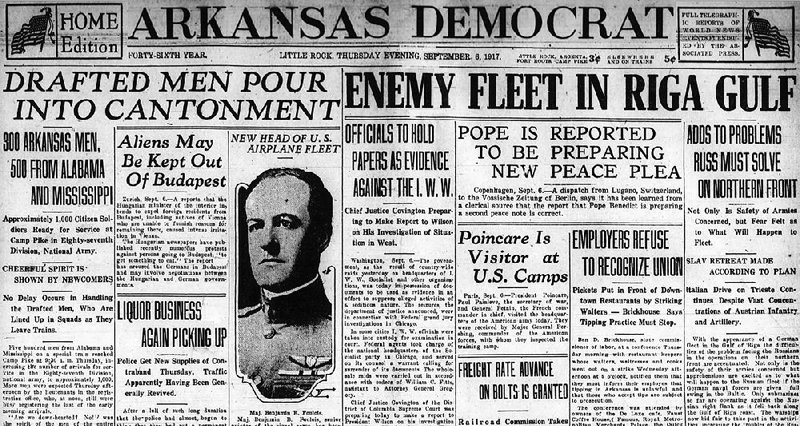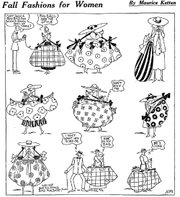Union supporters at Little Rock celebrated Labor Day 1917 without their usual ballgames, so members could support the war effort by doing a full day's work at Camp Pike in North Little Rock. But that evening, 500 gathered in Forest Park for speeches, a moving picture show and a dance.
I was intrigued to read about that long-ago Sept. 3 in "News of the Labor World," a weekly column written by union leaders and published from March 1912 to December 1917 in the Arkansas Gazette.
Even more intriguing was what happened Sept. 4, the first Tuesday in September 1917:
Joe Stathakis, well-liked proprietor of the Faust Cafe and Faust Coffee House in downtown Little Rock, fired 11 waiters in one fell swoop. Then came a strike.
Here's the Arkansas Democrat from Sept. 5:
Waiters and Cooks Strike at 5 O'clock
J.L. Kidd, business manager of the newly organized Hotel and Restaurant Employees' Union here, known as Local Union No. 313, announced at 2 o'clock Wednesday afternoon that a general strike of waiters, waitresses and cooks in virtually all restaurants in the city would be called at 5 o'clock Wednesday afternoon. The employees were to be ordered to quit work immediately.
[Confession: 1917 newspapers used the spelling "employes," but that made me itch; I have updated it.]
Restaurant owners and proprietors were visited Wednesday morning by a committee from the union, asking them to sign an agreement recognizing their right to organize. No question of hours or wages or working conditions was mentioned in the agreement. It was merely an agreement not to discharge employees who announced their intention of affiliating with the union.
Several owners signed the agreement, but many not only refused to sign but summarily dismissed every waiter or waitress they found had joined the union. Wednesday morning 49 waiters and waitresses found themselves without jobs when their employers learned they had attended the meeting Tuesday night.
Joe Stathakis and his brothers immigrated from Greece late in the 19th century. They were a large family with other siblings who settled in other states. They opened restaurants. According to the 1920 U.S. Census, the oldest brother, Pete, spoke English but didn't read or write; he was a cook. Joe, Sam and a nephew from Greece, Nick, did read and write, and all owned restaurants.
The name "Joe Stathakis" first appears in the Gazette in 1906 for a funny bit of mischief that we'll talk about next week. For more than a decade newspapers quoted the "chubby, ever-smiling" Joe on any and all Greek community concerns, from their support for their homeland when war broke out in the Balkans to whether Greeks were selling bananas in the street to the founding of Annunciation Greek Orthodox Church.
He advertised his Faust Cafe at 104 W. Markham St. as the finest restaurant in the South.
The Gazette reported his plan to open a lunchroom in February 1917 as another step in his success that could be credited to "hard, relentless work" and "personality, for he is emphatically what is known in the popular parlance as 'a good scout.'" When St. Louis police detained him in March 1917 in a misunderstanding involving newly hired waitresses, a reporter vouched for his good character.
The Gazette on Sept. 6:
"I was perfectly justified in discharging these 11 men," said Mr. Stathakis yesterday. "For instance, here is why I discharged one of them. A man and his wife gave an order to the waiter. The waiter made a mistake and gave her a dish that she did not order. She protested very politely and the waiter said: 'Oh, you're too cranky; I can't wait on you.' Of course I fired the man on the spot. What else could I have done. Then a committee from the Central Trades Council came around and demanded that I put this man back to work along with the others. I would close up my restaurant before I would put that man back to work and the others have been guilty of offenses just as bad. ...
"All are what is known as tramp waiters. They go from place to place, never remaining more than two or three months. I have been here 14 years. In all that time I have always employed union men whenever possible. I have paid a considerable amount of money to union men. Yet the Central Trades Council appears to prefer the word of these tramp waiters against mine."
He claimed that his waiters averaged $100 a month and "nearly anyone would say that this is good pay for labor that involves very little skill or training."
Eighty-one union members (16 of them women) signed up to picket with Local 313.
It is alleged by the union that the waiters and waitresses are forced to work 11 to 15 hours daily and that outside of their tips, they only receive $11 to $12 a week; that they have to pay if a dish is broken; that the proprietors may fine them as much as $5 if they are five minutes late and that they have to sign an agreement that they will give three days' notice when they leave, and if they do not, they forfeit three days' salary.
State labor commissioner Ben D. Brickhouse told the Gazette that he'd gotten Stathakis to admit that nearly half of the $100 he saw waiters earning was from tips, adding: "I said, 'I don't see how you can take any credit for tips to yourself, since it is unlawful to permit tipping.'"
D'oh! From 1913 until 1925, state law prohibited tipping.
The Democrat reported that by 11 a.m. Thursday, pickets were outside all restaurants that had refused to sign an agreement allowing their employees to join the union. Their placards read, "This restaurant is unfair to union labor."
No trouble occurred at any of the restaurants. In most of the restaurants the proprietors were too busy helping their reduced forces to serve customers to pay much attention to the pickets outside.
But there was trouble, and it inspired other tradesmen. Journeymen barbers objected that shop owners had extended their hours beyond the union maximum to accommodate soldiers and workmen from Camp Pike. And Sept. 8, members of another local, the Amalgamated Meat Cutters' and Butchers' Union, No. 544, began picketing two meat markets. Soon, telephone workers would strike against Southwestern Bell Telephone Co. in Little Rock, Pine Bluff and Fort Smith, leaving Fort Smith without service.
Stathakis petitioned chancery court Sept. 15 for an injunction against the 313's pickets, claiming they intimidated and threatened his customers and employees.
Meanwhile, patronage was picking up, driven by those Camp Pike paychecks, and restaurants needed wait staff. By Oct. 4, all the restaurateurs in Argenta had signed, including one Angelo Stathakis. Before year's end, 42 of 50 Little Rock restaurants would sign.
Oct. 6, Chancery Court Judge J.E. Martineau ruled in favor of Stathakis. The union appealed to the state Supreme Court, which in July 1918 upheld Martineau. The Gazette quoted from that decision:
"The labor union or its representatives and employees had the right to exhibit the placards in question to the public; but it is a far different thing to say that the right to exhibit these placards to the public carried with it the right to patrol or to picket appellee's places of business with these placards so as to interfere with his lawful business."
Next week we'll trace the amazing life of Joe Stathakis, that best known of Little Rock businessmen. By the way, his name wasn't Joe.
ActiveStyle on 09/04/2017

